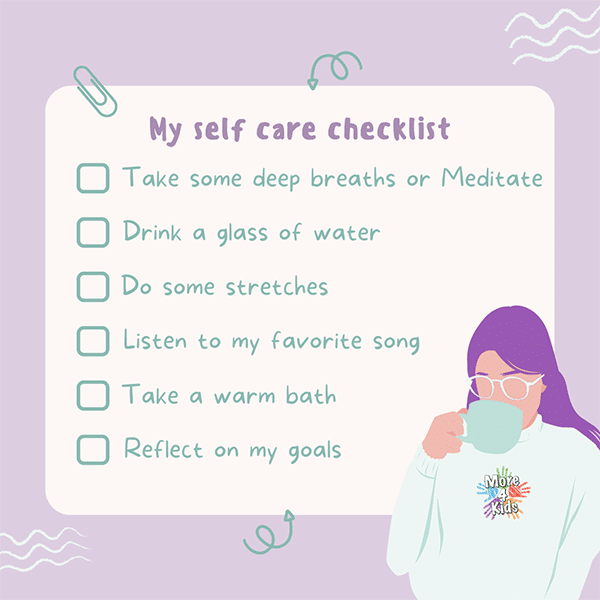by Dominica Applegate
Self Care: Taking Care of Yourself to Better Support Your Children
Table of Contents
Being a parent is a fulfilling experience, however, it demands a significant amount of time and effort, and at times, it can be challenging. Neglecting self-care can have negative consequences for both the parent and the family. I’m sure many parents can relate to these challenges.
Self-care is an essential practice for all parents, though it may not be emphasized enough. What does practicing self-care mean? Well, it involves taking time to prioritize your own physical, mental, and emotional well-being in order to be better equipped to provide love, support and guidance to your children.
Unfortunately, in today’s society, it’s all too easy for people – especially parents — to get overworked and under rested each day. It’s important not only to focus on getting things done, but also taking the upmost care of ourselves. Being a parent already puts a strain on your schedule, so it is important not to add to that by neglecting your own health. Self-care should be a priority, as without it, the ability to provide the best care for your family in the long term becomes compromised.
So, how can we begin to take better care of ourselves?
By creating a self-care plan that works with your lifestyle, goals, and schedule, so you can ensure you have the energy and resources to give your children the best support possible. This article will help you craft a plan that works for you so that you can be a better parent and caretaker of your children.
Click Here for the #1 Self Care Subscription Box for Moms
Steps To Create A Self-Care Plan
Creating a self-care plan won’t take you as much time as you think. For those of you that tend to feel guilty putting the focus on yourself, here’s your permission to let go of such a thought. Practicing self-care does not mean you’re selfish. It means that you value yourself. The more filled up and refreshed you feel, the better you’ll be for your family.
Here are are some tips to help you get started with your self-care plan:
1) Identify Your Goals
As a parent, it is important to first identify specific goals that align with your overall well-being. If you don’t know what fills you up or recharges your battery, then you probably aren’t practicing self-care. Some examples of self-care goals may include:
- Prioritizing physical health: This could include setting goals to exercise regularly, eat a balanced diet, and get enough sleep.
- Managing stress: You may want to set goals for finding ways to reduce stress, such as practicing mindfulness, taking breaks, or learning relaxation techniques.
- Building relationships: Self-care can also include setting goals for building and maintaining relationships with friends, family, neighbors, and loved ones.
- Engaging in hobbies: You may set goals for engaging in hobbies or activities that bring you joy and relaxation. When was the last time you spent time doing something you truly love, outside of being a parent?
- Prioritizing mental health: Your mental health matters. Goals for self-care could include seeking therapy or counseling, or learning coping mechanisms for stress and anxiety. There are many valuable YouTube videos on emotional and mental health by professionals and they’re free!
2) Assess Your Needs and Resources
Now that you’re aware of some goals, consider what areas in your life need more attention and how you can meet those needs with the resources available to you. Many of us have ambitions and dreams, but how many take the time to assess which areas in our lives require more attention? We have access to all sorts of resources at our fingertips, such as the internet.
Once you determine what areas of your life need attention, figure out how to address that area with the resources you have. If you’re burned out and need a vacation, plan one. If you’re carrying a lot of stress, schedule regular massages. If you need more quality time with your partner/spouse, make it happen. Reflect on what you need most and give yourself permission to make it happen.
3) Make an Action Plan
It’s wonderful to brainstorm self-care goals, but if you don’t do anything with them, you’re less apt to achieve them. To combat this, outline specific steps and tactics you can take to achieve your goals.
For example, if you want to enjoy less stress and more peace, scheduling some yoga sessions or make a commitment to daily meditation. Or, you could join a gym or sign up for a class that sounds like fun. Sit down and actually make action plans and then put that plan somewhere you see often, to serve as a reminder that you’re putting self-care first.
4) Schedule Time For Your Activities
Raising children is time consuming. It’s easy to block off most of your time taking them here or there, helping with homework, and spending quality time with them. But your wants and needs are important too. As part of your self-care plan, make sure to block off time in your schedule to make sure you are actually able to do the self-care activities you plan on doing. As you do, you’re also setting a good example for your children about self-care.
5) Reflect and Reassess
Be sure to revisit your self-care plan occasionally to make sure it is still relevant, and you are making progress towards those goals. As our children grow older, their needs change, and ours can too. Every few months, you may want to sit down and truly reflect on your current needs and see if they are being met. If not, simply do a reassessment and continue practicing self-care.
Take Time For Self-Care
Self-care is not a luxury but rather an essential practice for all parents. Make sure you are taking the time to prioritize your own well-being so that you can better support and care for your children. Again, give yourself permission to develop a self-care plan that fits your life and enables you to be the best parent possible. It’s never too late to take time for yourself. With a little creativity and effort, you can develop a self-care plan that boosts your ability to provide the love, energy and resources needed by your family – an investment in them as well as yourself!
Click Here for the #1 Self Care Subscription Box for Moms
Disclaimer
Please note that we are not medical or mental health professionals. If you feel something may be seriously wrong, such as deep depression or overwhelming anxiety, seek expert advice from licensed medical and psychological professionals to ensure that any issue is treated properly.
















Add Comment